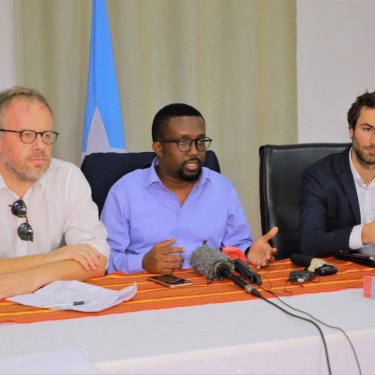During RSF’s first visit to Somalia, the Prime minister announces a moratorium on arrests of journalists

In response to the first-ever visit to Somalia by Reporters Without Borders (RSF), the country’s president has pledged to pursue his government’s efforts to promote press freedom, while the prime minister has announced that a moratorium on arrests of journalists will soon be decreed and implemented.
During an unprecedented meeting today with RSF secretary-general Christophe Deloire, Somali President Mohamed Farmaajo undertook to press ahead with combatting impunity for crimes against journalists and said he agreed on the principle of a moratorium on arrests and detention of journalists in connection with their work.
During a subsequent meeting with Mohamed Hussein Roble, Somalia’s new prime minister, Roble announced that this moratorium would be adopted soon. Its implementation is already being debated. Such a moratorium is one of the recommendations that RSF and the National Union of Somali Journalists (NUSOJ) have been advocating in recent months.
Arnaud Froger, the head of RSF’s Africa desk, and NUSOJ secretary-general Omar Faruk also attended today’s meetings, which took place in Villa Somalia, the president’s official residence and office. The delegation also met with the new information minister, Osman Abokor Dube.
The announcement represents a major commitment as regards protecting journalists in Somalia. At least 25 journalists were detained in 2019 – often for several days or even weeks – after being arrested arbitrarily by the security services, and the 2020 total will be even higher.
The RSF delegation also called for another revision of the “media law,” of which the latest version, promulgated in August, poses major dangers as well as containing a number of improvements on the 2016 version.
“This moratorium will constitute a major step forward for Somali journalists, in a country that has been near the bottom of the World Press Freedom Index for too long,” Deloire said. “We urge the president and the entire new Somali government to continue efforts to improve the environment for journalists and encourage the emergence of a free, independent, high quality press.”
Osman added: “This is a historic and unprecedented commitment that will help to end arbitrary arrests of Somali journalists and their often illegal detention. We will make every efforts to monitor its implementation, which we hope will begin as soon as possible.”
In the runup to parliamentary elections in December and a presidential election in February 2021, RSF has also called for the urgent creation of a dedicated mechanism for the security and protection of journalists, with the appointment of focal points in all the government ministries and agencies concerned.
Somalia continues to be one of the world’s most dangerous countries for the media. Fifty journalists have been killed in the past decade in Somalia, nearly half of the total killed in all of sub-Saharan Africa in the same period.
Recent months have seen encouraging signs as regards efforts to combat crimes of violence against Somali journalists. A policeman was convicted in absentia for a journalist’s murder and two soldiers were arrested and punished for mistreating two journalists during detention. A prosecutor has also just been appointed with special responsibility for investigating murders of journalists. He must be given the resources he needs to complete his investigations.
Somalia is ranked 163rd out of 180 countries in RSF's 2020 World Press Freedom Index.



